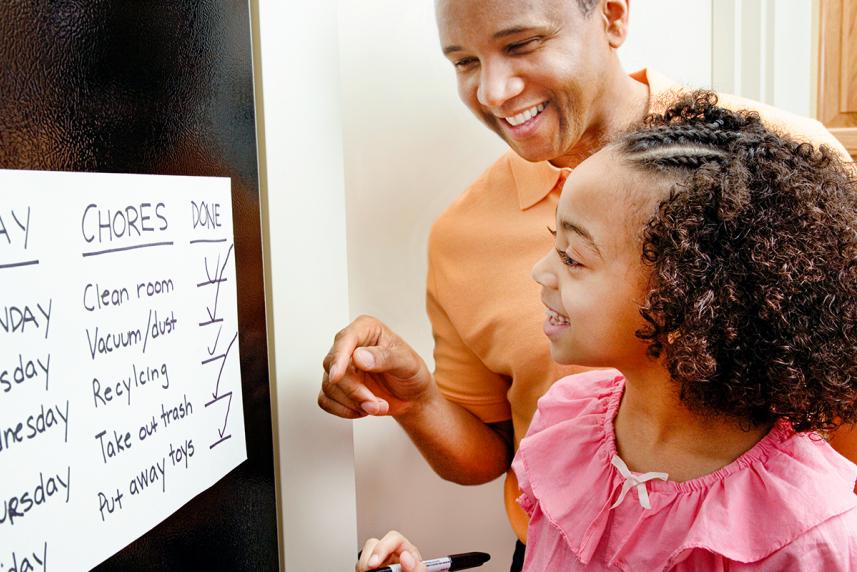
Get free coupons from Optum Perks — accepted at pharmacies nationwide.

Has your child been diagnosed with ADHD? Here are some tips for helping them thrive.
Finding out your child has attention deficit hyperactivity disorder (ADHD) can be tough to hear. You may have a swirl of emotions. You might be glad to finally have some answers. You might be worried, too. Will they need medicine? Will they be successful? Will they be happy?
ADHD is a brain condition that affects a child’s behavior. It may make it harder for them to sit still, focus and pay attention.1 You may want to do everything you can to help. After all, ADHD can affect every part of your child’s life. This can include their physical and emotional health. It also can include schoolwork and friendships.
First, take a deep breath. “ADHD is very common,” says William Horgan, DO. He’s a pediatrician with Reliant Medical Group, part of Optum Care, in Milford, Massachusetts. “It doesn’t mean a child will be on medicines for life. Their lack of focus can make life difficult for parents. But they can be very creative, too. Mostly, they’re just like other kids.”
Your doctor will help you come up with a care plan to support your child’s needs. Here are four simple steps you can take that may help your child with ADHD.

Get free coupons from Optum Perks — accepted at pharmacies nationwide.
There are about 6 million children with ADHD. That’s about 3 out of every 10 kids in the United States.2 When a child has ADHD, their brain works a little bit differently. They might have trouble paying attention. (That’s the “attention deficit” part of ADHD.) Or they might have a hard time sitting still (that’s the “hyperactivity” part). Or they might have both.
It’s normal for kids to have trouble focusing. Or sometimes they have too much energy. Common behavior problems for kids with ADHD include:3
Doctors aren’t sure exactly why kids get ADHD. Current research shows there might be a genetic component. That means it seems to run in families. It’s also connected to chemicals in the brain, says Dr. Horgan.
It’s important to find out all you can about ADHD. That can help you take positive steps to support your child. Ask your child’s pediatrician for resources, and read more from other medically reviewed resources online. A few good places to start:
Taking a team approach can help a child with ADHD do their best. Schools, families and health care professionals working together is key.4
Your child can benefit from a group of caring adults who look out for them. According to the CDC, more than 6 out of 10 kids with ADHD struggle with mental, emotional or behavioral concerns like anxiety or behavior problems. With a team in place, you can spot problems early since symptoms may show up in different areas of their life. Your child's care team may include:
These caring team members can support your child and help them understand that ADHD isn’t a disability. It’s another way of being a kid. Together, you and your team can let your child focus on their unique and beautiful strengths.
Creating structure in their day can help with your child’s behavior. Knowing what to expect and when can help. You can make lists of what they need to do each morning, afternoon and evening. Keep them short and post them on the fridge. Younger kids may enjoy helping you make the list.
Healthy eating habits are important, too. Feeding your child lots of fruits and vegetables can help them eat healthier. And so can plenty of exercise. Make sure they have lots of time to play and release their energy.
One of the best habits is a better sleep schedule, says Dr. Horgan. “Make sure your child is getting enough sleep,” he advises. School-age kids should get nine to ten hours a night. “And limit their screen time, especially before bed.” Better sleep can mean fewer problems with ADHD.
Taking medicines won’t cure ADHD, Dr. Horgan explains. But if therapy or lifestyle changes aren’t working, your doctor may discuss medicine as an option. It can help your child better handle their ADHD. The medication works by boosting levels of a brain chemical that helps them pay attention.5
There are two different types of ADHD medicines:
Stimulants. These medications act fast. As many as eight out of ten children do better with this kind of medicine. Some examples of stimulant ADHD medicines are:
Nonstimulants. These take a little longer to kick in. But they can keep working for up to 24 hours. That can make them a good choice for kids who don’t want to visit the school nurse during class. Some examples of nonstimulants include:
Save up to 80% on your medications. Get coupons from Optum Perks. They’re accepted at pharmacies nationwide. Find coupons.
If your child’s doctor thinks ADHD medicines are right for your child, they may try different ones until they find what works best. Your doctor will look out for side effects like sleep problems or tummy troubles. They may also talk with you about how long your child may need to take medication. For some kids, it may be temporary. For others, it may be longer-term. Every child is different.
That’s why it’s important to go to all the follow-up visits. And remember: Medicines can work well, but they’re just one piece of the puzzle.
Most important, be sure to let your child know that you love and support them. After all, millions of adults had ADHD when they were young, too. As your child grows, you might find that little by little their behaviors are improving. The strategies they learn now may help them have a childhood that’s even happier. Plus, you’ll enjoy watching them grow into adults who are confident, creative and healthy.
Looking for a doctor who gets you? We have more than 60,000 doctors at over 2,000 locations. Our team will help you get the care you need, when and where you need it. Find care near you.
Sources
© 2023 Optum, Inc. All rights reserved. Do not reproduce, transmit or modify any information or content on this website in any form or by any means without the express written permission of Optum.
The information featured in this site is general in nature. The site provides health information designed to complement your personal health management. It does not provide medical advice or health services and is not meant to replace professional advice or imply coverage of specific clinical services or products. The inclusion of links to other web sites does not imply any endorsement of the material on such websites.
Stock photo. Posed by model.